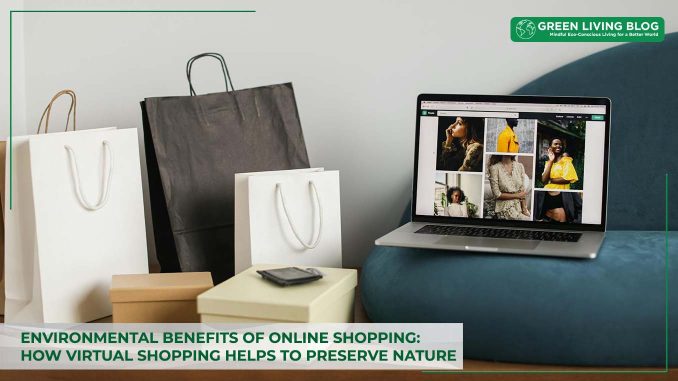
The e-commerce industry has shown plenty of advantages for humanity, which always seeks innovation. It has become a part of everyone’s life since any necessary item is available with several clicks.
However, researchers express their concerns about the possible impact of online commerce on the environment.
Everything that is extra convenient is usually harmful, which is also believed about shopping for clothes online. Nonetheless, online shopping represents a lot of benefits, which unite most internet retailers with one aim: to sell sustainably.
Let’s explore the advantages for the environment posed by online shopping!
1. Prevention of Over-Consumerism

The main pro of online shopping platforms is their convenience, yet these benefits also work on nature saving. When shopping for clothes items online, we have more possibility to compare prices, to double-think important purchases. Thus, the innovative tools and responsible smart platforms like OrangeShoppers provide us with the possibility to avoid impulse purchases.
Overconsumption has become a great factor in increasing the number of landfills all over the world, which resulted in polluting soil, water, and, later, even air.
When you can think about the order the other day, you are less likely to end up getting unnecessary items. Wandering the stores at the mall, we tend to grab things impulsively because it seems that this experience is exclusive, and we’ll not get any chance to buy this item anymore.
At streamlined online shopping platforms, we not only have extra time to double-think but also visualize it more and check the reviews. This can help to prevent buying lots of clothes and wasting them.
2. Lower Transportation-Related Pollution
Despite delivery options, which are the main requirement for shopping online being considered a drawback, it’s not true. Any transportation harms the environment because vehicles produce emissions, which pollute the air. However, it’s important to consider how much fuel is burnt whenever the clothing is transported.
If you order online, your order makes its way from the stock location straight to your home or pickup point. Whereas if you prefer a mall, the amount of air pollution by vehicle emissions is higher, because it requires two stages of delivery. First of all, it has to arrive at the mall, then you waste time driving there, and eventually the vehicle produces harmful discharge while you’re driving with your new purchase home.
It is also important to remember that the reduction of greenhouse gas emissions can contribute to decreasing the harmful impact of climate change. Among other negative aspects of the greenhouse effect is the possibility of constant low-quality air, which leads to respiratory issues among people and animals.
3. No Land Necessary
One more benefit of online stores is that they do not need a location to run their businesses. Shopping malls not only take up a lot of land, which could be used for landscaping. They also consume a lot of water and energy, produce tons of garbage, and therefore become the cause of major emissions and waste. With modern technologies such as dropshipping current online clothes stores don’t even need a storage place, which decreases their negative impact on nature.
4. Social Initiatives

Current society feels extremely guilty for all harmful climate changes, which creates a lot of initiatives from businesses or even customers, which help to preserve nature. A lot of effort is put into engaging customers to spend more time and money to save the environment. Among such initiatives are:
- Carbon offset programs. Some online retailers offer to offset their order’s carbon emissions at checkout. Raised funds go to projects like reforestation or renewable energy.
- Minimal packaging trend. Some online stores offer sustainable non-plastic packaging with the lowest amount of paper for an extra charge. Yet we’re also proud that most of the stores don’t charge for that. They put their funds to only deliver products in eco-friendly packaging.
- Cancelling of single-use plastic. E-commerce platforms don’t tend to pack clothing items in single packages anymore. Instead, they came up with initiatives to produce packaging that can be used later, like fabric bags or boxes for storage.
- Environmental charities support. Instead of giving responsibility to the customer, whether to support social initiatives or not, some online retailers just do it by themselves. The announcement of donating a set amount of their profit to go-green projects not only encourage customers to shop there but also showcases great contributions.
The Spread of Eco-Trends
Nowadays, when it’s stated that the product is eco, people are ready to pay more and feel more like caring about nature. Apart from the psychological aspect, it does represent a great contribution. The e-commerce industry has turned eco-friendly packaging, delivery, or even whole products into a great subject for sale. Moreover, today eco-conscious brands are more respected in the market, which also engages customers in programs like tree planting.
Ultimately, there are more environmental benefits from online shopping for clothes. These trends not only help preserve natural resources and reduce waste but also empower consumers to make sustainable choices. As the demand for green alternatives continues to grow, online retailers will make environmentally friendly practices more accessible, mainstream, and impactful.
![]()
Author Profile
- Online Media & PR Strategist
- Blogger and Educator by Passion | Senior Online Media & PR Strategist at ClickDo Ltd. | Fascinated to Write Lifestyle Blogs in News & Education I have completed a journalism summer course at the London School of Journalism and manage various blogs.
Latest entries
 LeisureApril 16, 202510 Best Green UK Hotels for Eco-Tourists
LeisureApril 16, 202510 Best Green UK Hotels for Eco-Tourists Best practicesApril 14, 20258 Best Ways to Reduce Your Carbon Footprint
Best practicesApril 14, 20258 Best Ways to Reduce Your Carbon Footprint Green Expert GuidesMarch 28, 2025Lisbon Living: Where Sustainable Charm Meets Urban Energy
Green Expert GuidesMarch 28, 2025Lisbon Living: Where Sustainable Charm Meets Urban Energy EnvironmentJanuary 21, 2025Buying Eco-Friendly Homes: 6 Eco Questions to Ask Your Real Estate Agent
EnvironmentJanuary 21, 2025Buying Eco-Friendly Homes: 6 Eco Questions to Ask Your Real Estate Agent






Leave a Reply
You must be logged in to post a comment.